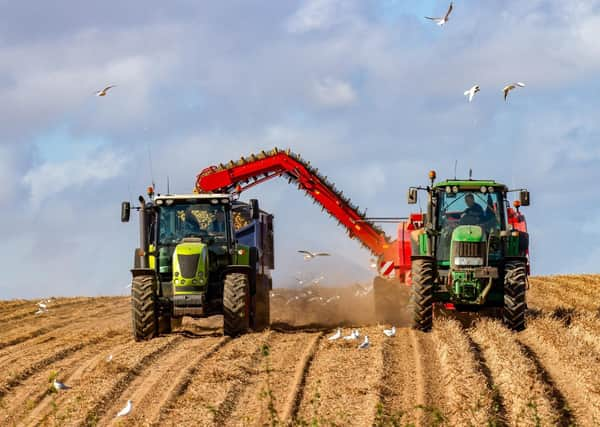Expert urges caution around farm machinery investment drive


James Treverton, of rural insurance broker Lycetts, is calling on farmers to make informed decisions about new machinery purchases, as the market recovers from a drop in sales in 2020.
According to figures from AEA Economics Department/DVLA, tractor registrations fell back in 2020 to their lowest level in twenty years, likely driven by uncertainties caused by the pandemic, reduced labour capacity, climate extremes, and Brexit.
Advertisement
Advertisement
Despite an upturn following the easing of restrictions from the first wave of coronavirus, registrations for the year were still 14 per cent lower than in 2019, totalling 10,380 machines.


UK tractor registrations are taken as a broad indicator of the strength of the domestic market for agricultural equipment, as they are registered with the Department for Transport. In value terms, sales of tractors account for almost one half of farmers’ total spend on equipment.
As the latest figures demonstrate – with tractor sales from August 2020 to August 2021 increasing by a quarter – confidence in capital investment is picking up, which may be influenced by favourable tax incentives.
For farmers who deferred buying new machinery, now may seem like the most appropriate and cost-effective time to invest – but James warns against hasty decisions.
Advertisement
Advertisement
“Farm machinery is a significant outlay for farmers, with pre-pandemic figures putting the average gross expenditure on machinery per farm at £36,200,” he said.
“Both the nation’s green recovery and economic recovery will be driving factors behind increased investment, as farmers set their sights on more sustainable and productive agricultural solutions.
“Government measures to stimulate business spending will also be playing part. For example, the £1 million annual investment allowance (AIA) has been extended until 1 January 2022.
“This means farm businesses can continue to claim up to £1m in same-year tax relief for capital investment in plant and machinery.
Advertisement
Advertisement
“To further stimulate business spending, a new capital allowance for businesses investing in plant and machinery was announced in the latest Budget, which will be in place until 31 March 2023. The ‘super deduction’ incentive allows companies a reduction in their tax bill for every pound they invest in new equipment.
“Whilst this will make expenditure more attractive, it is important that farmers take stock, to thoroughly plan purchases, including cost-effectiveness based on farm output projections, and to have a farm investment strategy in place before coming to any concrete conclusions.
“The first step is to conduct a full audit of machinery, taking account of predicted value, depreciation, remaining interest, machinery condition, suitability for current operations, and running costs.
“Farmers should also have a clear idea of how current vehicles and potential investments fit within their yearly budget. Dated machinery may not be as effective and have higher running and maintenance costs – but new machinery involves significant upfront costs that eat into often stretched income.
Advertisement
Advertisement
“Farmers are already feeling the financial squeeze and it is a fine balancing act between getting full use out of current machinery and making a valuable and timely investment that can help boost productivity.
“Engineering inspections can help give farmers valuable insight and give farmers a steer on the feasibility of replacing or repairing machinery to maximise efficiencies and reduce cost burdens.”
James said the fast-paced technological advancements and the UK’s sustainability objectives should also be a consideration.
“With the phasing out of direct payments, the government has taken the opportunity to put increasing domestic productivity and minimising environmental impact front and centre of future funding,” he explained.
Advertisement
Advertisement
“The introduction of the Farming Investment Fund, which is due to be released in autumn, underlines the government’s commitment to driving agricultural business investment, and aims to facilitate farmers expanding their enterprises, whilst enhancing environmental goods.
“The fund presents an opportunity for farmers to invest in new and innovative technologies, such as precision agriculture equipment, robotic or automated technology, and livestock monitoring cameras.
“Future-proofing operations is the key priority for farmers today so any ways of improving crop yields and boosting farm efficiencies will be welcomed.
“It is important to remember the insurance implications of buying new machinery. Farm machinery – in particular high-end, technologically-advanced equipment – is an attractive target for thieves and can be very costly to replace or repair should it be stolen or damaged.
“Ensure that any new piece of equipment has the right level of cover, that the building it is stored in has the right level of cover, and that security is robust.”